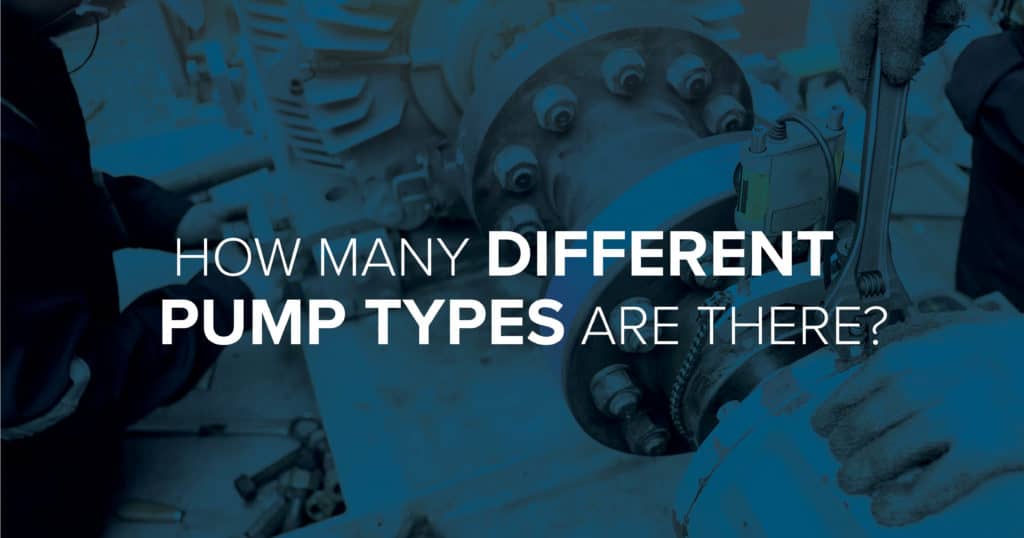As you may know, there many different types of pumps out there. They offer a wide variety of sizes, configurations and mechanical designs, with most being best suited for specific processing applications. Quite simply, some pumps are better for certain jobs than others. At DXP Pacific, we are all about matching our customers with the best pumps for their specific applications in order to produce more consistent, dependable and efficient results.
With this in mind, we have put together this simple overview of all the different pump types you should know about:
- Centrifugal Pumps
This is a general term for a common category of pumps with one or more impellers. Centrifugal pumps generally offer the highest flow rates and are ideal for clean, dirty and low-viscosity liquids. You will not want to use a centrifugal pump for fluids that contain air or vapors. They are available in horizontal and vertical configurations.
- Positive Displacement Pumps
Positive displacement pumps are the other most common general pump type. These pumps do not have impellers. They use rotating or reciprocating components to push the liquid through the pump using a positive displacement method. They are good for high-viscosity fluids, fluids containing shear-sensitive solids and other liquids that require a gentler pumping motion.
- Submersible Pumps
Submersible pumps are exactly as the name describes. They are designed to be used underwater, typically in applications like sump pits, cooling towers, sewage lift stations, mines and construction drainage.
- Progressive Cavity Pumps
Progressive cavity pumps utilize a single-threaded helically shaped rotor inside of a double-threaded stator. This results in a progressive cavity pumping motion which moves the liquid as it pressurizes it. These pumps are great for water and wastewater treatment, for fluids with little-to-no viscosity and for solids-bearing liquids. Progressive cavity pumps are commonly found in sewage treatment plants, pulp mills, petrochemical and chemical plants.
- Rotary Gear/Vane Pumps
Rotary gear and rotary gear vane pumps are utilized in food processing, pharmaceutical, industrial and municipal applications. These are the most commonly used type of positive displacement of pump, able to consistently move fluids at a fixed flow rate.
- Metering Pumps
Metering pumps provide a very low flow rate and are adjustable to give you highly consistent performance. They are mostly used in chemical dosing and chemical treatment applications, as well as boiler water, cooling towers and potable water processing.
- Vertical Turbine Pumps
These are designed to fit in a bore-hole well with a vertical shaft design. They are used most often in water supply, fire pumps and cooling water applications.
- Seal-less/Magnetic Pumps
These pumps utilize a magnetic drive system and an innovative seal-less design that enables them to withstand volatile and aggressive chemicals and caustic liquids. They are commonly used in oil and gas, power generation, pulp and paper, water processing and chemical processing applications.
- API Process Pumps
API process pumps are built to meet API 610 standards for refineries, pipelines and other hydrocarbon processing applications. They utilize closed impellers and locked wearing rings to reduce thermal movement.
- Lobe Pumps
Lobe pumps utilize two shaft drive lobes that mesh together, but do not touch. They provide a gentle pumping motion that is great for food, beverage, pharmaceutical and other hygienic pumping applications.
- Air-Operated Double Diaphragm (AODD) Pumps
AODD pumps feature two diaphragms that are driven by compressed air rather than an electric motor. They are good in remote situations where electricity isn’t available, and also for moving liquids with high solids content or high viscosity.
- Slurry Pumps
This is another more general term that encompasses different pump types that are designed to handle abrasive slurries. Example applications include mining, dredging, steel mills, and wastewater processing.
- Peristaltic/Hose Pumps
Peristaltic pumps (also known as hose pumps) are a type of rotary positive displacement pump. They have a roller or shoe that effectively squeezes a tube or hose as it rotates. This keeps the liquid moving along. They are found in sewage treatment plants, swimming pools and other OEM applications where seal-less pumping offers an advantage.
- Self-Priming Pumps
Certain types of centrifugal pumps are considered self-priming. They do not require external priming or foot valves to operate. They are used in sump pits and certain fluid transfer services where the pump needs to be located above the suction vessel.
- Vacuum Pumps
Vacuum pumps utilize a vacuum suction pressure. Examples include rotary vane, lobe, screw, claw and liquid ring pumps. They are found in vacuum packaging, chemical processing and pharmaceutical applications.
- Screw Pumps
Screw pumps have two or more intermeshing screws that are driven by timing gears. They are ideal for processing oils and other highly viscous liquids.
- Other Pumps
The pump types we’ve mentioned above are the most standard types of pumps out there. There are still other even more specific designs that we won’t get into now, but here’s a short list:
– Axial Flow Pumps
– Booster Pumps
– Canned Motor Pumps
– Chopper Pumps
– Circular Pumps
– Cryogenic Pumps
– Drum Pumps
– End-Suction Pumps
– Fire Pumps
– Flexible Impeller Pumps
– Grinder Pumps
– Horizontal Split Case Pumps
– Multistage Pumps
– Piston Pumps
– Plunger Pumps
– Trash Pumps
The point is that there are many different pump styles out there and it’s important to know some of the key differences between them. They operate differently and are designed for different pumping purposes, so be sure and do your research before buying a pump for your plant.
Contact DXP Pacific today for more help with your pump selection and custom pump configuration needs. We carry exceptional pumps from the world’s top pump manufacturers, so we will help you make the right decisions.

